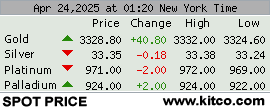|
You do own Gold and Silver . . . right ? I sure hope so! For numerous very compelling reasons, owning gold and silver is the only way you will be able to preserve your purchasing power and survive the Global Financial Crisis (GFC). But just owning this "real money" is not enough . . . It is also vital that you store it outside the country of your citizenship. Why ? . . . Because like it or not . . . captial controls are coming . . . sooner than you may think. You simply must get your precious metals out of the country now . . . before it is too late . . .
You must act before it becomes illegal to do so . . . As the GFC continues, governments of the developed world are struggling to find buyers of their debt, and out of desperation will likely impose strict penalties for net outflows. Unfortunately, most people will be too broke, too stupid, or too distracted to care that their savings are trapped in a rapidly depreciating currency within a federalized, bankrupt financial system. You are clearly not one of these people or you wouldn't be visting this web site. Moving some money out of your home country now makes a lot of sense; if you keep all of your wealth within one country, particularly where you live or your business is based, you are completely exposed to exchange controls, tax confiscation, litigation, extortion, etc. As we already dicussed, planting a bank flag is certainly a good idea, but precious metals present an interesting alternative because they effectively exists outside of the financial system. When you use a credit card, check, wire transfer or even cash, the transactions are reported to the government. Banks, brokers, real estate agents, car salesmen, etc. are essentially unpaid government agents, forced to report on their customers' financial activities. Converting paper currency into precious metals is an excellent way to privatize your wealth. To most governments, precious metals are just personal property. Consequently, because most countries do not recognize precious metals as monetary instruments (at least based on its market value), they can be moved freely and privately across most borders. Once overseas, it makes sense to store precious metals in a private vault facility that is not part of any financial system, which unlike bank safety deposit boxes, are not subject to any reporting requirements. Best Safety Boxes in Panama is one such facility; there is also Singapore's Cisco Certis; in Hong Kong, The Storage; and in Vienna, Das Safe. When you're conducting your due diligence on a private storage facility, you obviously want to be comfortable with the security and reputation of the owners and management. More importantly, however, you should be comfortable with the jurisdiction . . . Accordingly, one must know the answers to these important questions:
It's an important question and varies by jurisdiction. In Panama, when an individual box holder dies, it will take a Panamanian court order to allow access to the beneficiaries or successors. While corruption in Panama is clearly on the mend, I still wouldn't want to petition a Panamanian judge for access to millions of dollars of gold locked in a vault. The bureaucracy alone would be mind-numbing. One easy solution to this problem is to have a corporate account, establishing a Panamanian trust or corporation as the box-holder, the shares of which would automatically be granted to beneficiaries in the event of the principal shareholder's death.
|

 >
>